


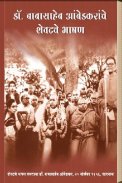
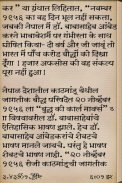
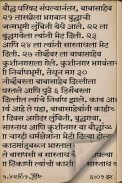
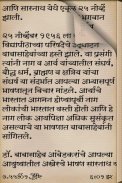
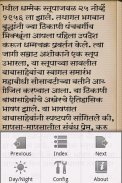
Dr. Ambedkar's Last Speech

Deskripsi Dr. Ambedkar's Last Speech
Bhimrao Ramji Ambedkar, popularly also known as Babasaheb, was an Indian jurist, political leader, philosopher, anthropologist, historian, orator, economist, teacher, and editor. He was also the Chairman of the Drafting Committee of Indian Constitution. In 2012 he was chosen greatest Indian in a nationwide poll held by History TV and CNN-IBN.
Overcoming numerous social and financial obstacles, Ambedkar became one of the first Dalit (untouchable) to obtain a college education in India. Eventually earning law degree and doctorates for his study and research in law, economics and political science from Columbia University and the London School of Economics, Ambedkar gained a reputation as a scholar and practiced law for a few years, later campaigning by publishing journals advocating political rights and social freedom for India's untouchables. Mahatma Gandhi and Ambedkar often clashed because Ambedkar sought to remove the Dalits out of the Hindu community, while Gandhi tried to save Hinduism by exorcising untouchability. Ambedkar complained that Gandhi moved too slowly, while Hindu traditionalists said Gandhi was a dangerous radical who rejected scripture. Guha noted in 2012 that, "Ideologues have carried these old rivalries into the present, with the demonization of Gandhi now common among politicians who presume to speak in Ambedkar’s name." Guha adds that their work complemented each other, and Gandhi often praised Ambedkar.
This book contain Last Speech of Dr. Babasaheb Ambedkar's.
Bhimrao Ramji Ambedkar, populer juga dikenal sebagai Babasaheb, adalah seorang ahli hukum India, politik pemimpin, filsuf, antropolog, sejarawan, orator, ekonom, guru, dan editor. Dia juga Ketua Komite Penyusunan Konstitusi India. Pada tahun 2012 ia terpilih terbesar India dalam jajak pendapat nasional yang diselenggarakan oleh Sejarah TV dan CNN-IBN.
Mengatasi berbagai hambatan sosial dan keuangan, Ambedkar menjadi salah satu Dalit pertama (tak tersentuh) untuk memperoleh pendidikan tinggi di India. Akhirnya mendapatkan gelar hukum dan doktor untuk studi dan penelitian dalam hukum, ekonomi dan ilmu politik dari Columbia University dan London School of Economics, Ambedkar mendapat reputasi sebagai seorang sarjana dan praktek hukum selama beberapa tahun, kemudian berkampanye dengan menerbitkan jurnal advokasi politik hak dan kebebasan sosial untuk tersentuh India. Mahatma Gandhi dan Ambedkar sering bentrok karena Ambedkar berusaha untuk menghapus Dalit dari masyarakat Hindu, sementara Gandhi mencoba menyelamatkan Hindu oleh mengusir tak tersentuh. Ambedkar mengeluh bahwa Gandhi bergerak terlalu lambat, sementara tradisionalis Hindu mengatakan Gandhi adalah seorang radikal yang berbahaya yang menolak kitab suci. Guha mencatat pada 2012 bahwa, "ideolog telah dilakukan ini persaingan lama ke masa kini, dengan demonisasi Gandhi sekarang umum di kalangan politisi yang menganggap untuk berbicara dalam nama Ambedkar." Guha menambahkan bahwa pekerjaan mereka saling melengkapi, dan Gandhi sering dipuji Ambedkar.
Buku ini berisi Pidato terakhir dari Dr. Babasaheb Ambedkar.
Bhimrao Ramji Ambedkar, popularly also known as Babasaheb, was an Indian jurist, political leader, philosopher, anthropologist, historian, orator, economist, teacher, and editor. He was also the Chairman of the Drafting Committee of Indian Constitution. In 2012 he was chosen greatest Indian in a nationwide poll held by History TV and CNN-IBN.
Overcoming numerous social and financial obstacles, Ambedkar became one of the first Dalit (untouchable) to obtain a college education in India. Eventually earning law degree and doctorates for his study and research in law, economics and political science from Columbia University and the London School of Economics, Ambedkar gained a reputation as a scholar and practiced law for a few years, later campaigning by publishing journals advocating political rights and social freedom for India's untouchables. Mahatma Gandhi and Ambedkar often clashed because Ambedkar sought to remove the Dalits out of the Hindu community, while Gandhi tried to save Hinduism by exorcising untouchability. Ambedkar complained that Gandhi moved too slowly, while Hindu traditionalists said Gandhi was a dangerous radical who rejected scripture. Guha noted in 2012 that, "Ideologues have carried these old rivalries into the present, with the demonization of Gandhi now common among politicians who presume to speak in Ambedkar’s name." Guha adds that their work complemented each other, and Gandhi often praised Ambedkar.
This book contain Last Speech of Dr. Babasaheb Ambedkar's.



























